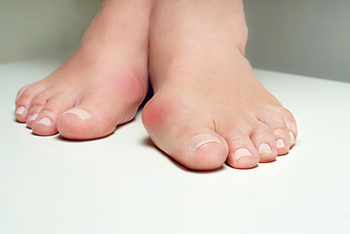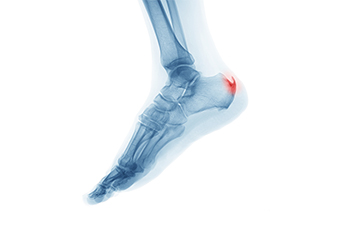
Achilles tendinitis, a painful condition affecting the Achilles tendon, is a common ailment among individuals who engage in sports and physical activities. This vital tendon connects the calf muscles to the heel bone and plays a crucial role in activities such as walking, running, and jumping. Achilles tendinitis is characterized by inflammation and micro tears in the Achilles tendon. This condition typically occurs due to overuse, intense physical activity, or sudden increases in exercise intensity. Wearing improper footwear, having tight calf muscles, and poor biomechanics can also contribute to its development. Understanding the definition and causes of Achilles tendinitis is essential for those seeking to prevent or manage this painful condition, allowing individuals to maintain an active lifestyle with proper care and precaution. If you have pain in the heel and calf areas, it is suggested that you confer with a podiatrist who can accurately diagnose and treat Achilles tendinitis.
Achilles tendon injuries need immediate attention to avoid future complications. If you have any concerns, contact Dr. Kendall Blackwell of InStride Wilson Podiatry Associates. Our doctor can provide the care you need to keep you pain-free and on your feet.
What Is the Achilles Tendon?
The Achilles tendon is a tendon that connects the lower leg muscles and calf to the heel of the foot. It is the strongest tendon in the human body and is essential for making movement possible. Because this tendon is such an integral part of the body, any injuries to it can create immense difficulties and should immediately be presented to a doctor.
What Are the Symptoms of an Achilles Tendon Injury?
There are various types of injuries that can affect the Achilles tendon. The two most common injuries are Achilles tendinitis and ruptures of the tendon.
Achilles Tendinitis Symptoms
Rupture Symptoms
Treatment and Prevention
Achilles tendon injuries are diagnosed by a thorough physical evaluation, which can include an MRI. Treatment involves rest, physical therapy, and in some cases, surgery. However, various preventative measures can be taken to avoid these injuries, such as:
If you have any questions please feel free to contact our office located in Wilson, NC . We offer the newest diagnostic tools and technology to treat your foot and ankle needs.

Children's feet are essential for their overall health and development. However, various foot problems can affect children as they grow. Flat feet, or pes planus, is a common condition where the arches on the inside of the feet do not develop fully, making the entire sole touch the ground. While this is normal in infants, it should resolve as they age. Ingrown toenails can cause pain, redness, and swelling, often the result of improper nail trimming or tight shoes. Proper nail care and footwear are key to preventing this issue. Sever's disease, medically termed calcaneal apophysitis, is common in active children between the ages of 8 and 14. It affects the growth plate in the heel and causes heel pain, especially during physical activities. Deformities, such as clubfoot, curly toes or overlapping toes, can be present from birth or develop later. Early intervention can help correct these deformities. Parents may wish to regularly inspect their children's feet and seek the help of a podiatrist for any of these common foot problems.
The health of a child’s feet is vital to their overall well-being. If you have any questions regarding foot health, contact Dr. Kendall Blackwell of InStride Wilson Podiatry Associates. Our doctor can provide the care you need to keep you pain-free and on your feet.
Tips for Keeping Children's Feet Healthy
If you have any questions, please feel free to contact our office located in Wilson, NC . We offer the newest diagnostic and treatment technologies for all your foot care needs.

Bunions, a painful bump at the base of the big toe, are a common and often misunderstood foot condition. They develop when the joint at the base of the big toe becomes misaligned, causing the tip of the big toe to angle toward the other toes. This misalignment results in a bony protrusion, also known as a bunion. While bunions can be the result of a genetic predisposition, they can also be triggered or exacerbated by various factors. Wearing ill-fitting shoes, especially those with narrow toe boxes or high heels, can force the toes into unnatural positions and contribute to bunion development. Additionally, repetitive stress or trauma to the foot can significantly contribute to getting a bunion. Understanding the causes is essential in preventing and managing bunions, as early intervention and lifestyle changes can help alleviate symptoms and slow their progression. If you have developed a bunion, it is strongly suggested that you speak with a podiatrist who can guide you toward relief and treatment options that are right for you.
If you are suffering from bunion pain, contact Dr. Kendall Blackwell of InStride Wilson Podiatry Associates. Our doctor can provide the care you need to keep you pain-free and on your feet.
What Is a Bunion?
Bunions are painful bony bumps that usually develop on the inside of the foot at the joint of the big toe. As the deformity increases over time, it may become painful to walk and wear shoes. Women are more likely to exacerbate existing bunions since they often wear tight, narrow shoes that shift their toes together. Bunion pain can be relieved by wearing wider shoes with enough room for the toes.
Causes
Symptoms
In order to diagnose your bunion, your podiatrist may ask about your medical history, symptoms, and general health. Your doctor might also order an x-ray to take a closer look at your feet. Nonsurgical treatment options include orthotics, padding, icing, changes in footwear, and medication. If nonsurgical treatments don’t alleviate your bunion pain, surgery may be necessary.
If you have any questions, please feel free to contact our office located in Wilson, NC . We offer the newest diagnostic and treatment technologies for all your foot care needs.

Heel spurs, a common yet often misunderstood foot condition, can bring discomfort in every step we take. These bony growths form on the underside of the heel bone and are a condition involving inflammation of the connective tissue. Causes of heel spurs can include repetitive strain on the foot, poor footwear choices, and biomechanical issues that strain the plantar fascia. Symptoms can range from sharp pain in the heel, especially upon waking or after prolonged periods of rest, to aching discomfort that persists during the day. The path to relief begins with understanding. While heel spurs themselves may not always require treatment, addressing the underlying causes through rest, proper footwear, and stretching can significantly alleviate pain and discomfort. If you have heel pain, it is strongly suggested that you consult a podiatrist who can effectively diagnose and treat heel spurs.
Heel spurs can be incredibly painful and sometimes may make you unable to participate in physical activities. To get medical care for your heel spurs, contact Dr. Kendall Blackwell from InStride Wilson Podiatry Associates. Our doctor will do everything possible to treat your condition.
Heels Spurs
Heel spurs are formed by calcium deposits on the back of the foot where the heel is. This can also be caused by small fragments of bone breaking off one section of the foot, attaching onto the back of the foot. Heel spurs can also be bone growth on the back of the foot and may grow in the direction of the arch of the foot.
Older individuals usually suffer from heel spurs and pain sometimes intensifies with age. One of the main condition's spurs are related to is plantar fasciitis.
Pain
The pain associated with spurs is often because of weight placed on the feet. When someone is walking, their entire weight is concentrated on the feet. Bone spurs then have the tendency to affect other bones and tissues around the foot. As the pain continues, the feet will become tender and sensitive over time.
Treatments
There are many ways to treat heel spurs. If one is suffering from heel spurs in conjunction with pain, there are several methods for healing. Medication, surgery, and herbal care are some options.
If you have any questions feel free to contact our office located in Wilson, NC . We offer the latest in diagnostic and treatment technology to meet your needs.